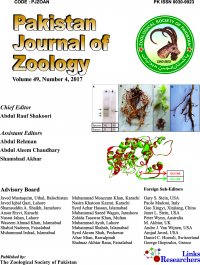ABSTRACT
A 150 day feeding trial was performed to investigate the effect of stocking densities on growth performance, serum biochemical parameters, digestive enzymes activity and antioxidant status of largemouth bass (Micropterus salmoides) reared in an in-pond raceway system (IPRS). Fish (initial average body weight: 35.68±2.12g) were randomly allotted to in-pond raceways (26.2m×5m×2.5m) stocked at two stocking densities (68 and 114 fish/m3, respectively). Fish were fed twice daily (08:00 and 17:00), and the daily ration feed was 4% of the body weight. No significant differences were observed in growth, digestive enzyme activity and antioxidant status between fish reared at two stocking densities (P>0.05). Alanine aminotransferase (ALT), aspartate aminotransferase (AST), alkaline phosphatase (ALP), superoxide dismutase (SOD), cortisol and lysozyme in serum showed no significant differences between the two stocking groups (P>0.05). Fish reared at high stocking density had significant lower total protein (TP), cholesterol (TC), triglyceride (TG) and glucose (Glu) content in serum compared with those reared at low density on day 90 and 120 (P<0.05). In conclusion, the present results indicated that the largemouth bass (36-308 g) could be reared at high stocking density without depressed growth and chronic stress in commercial-scale in-pond raceway systems under this experimental conditions.
To share on other social networks, click on any
share button. What are these?










